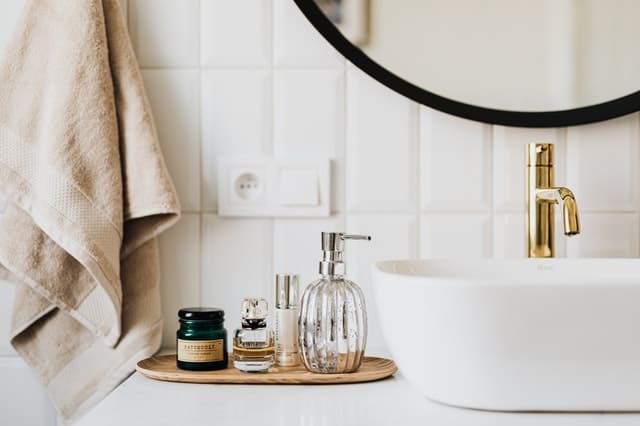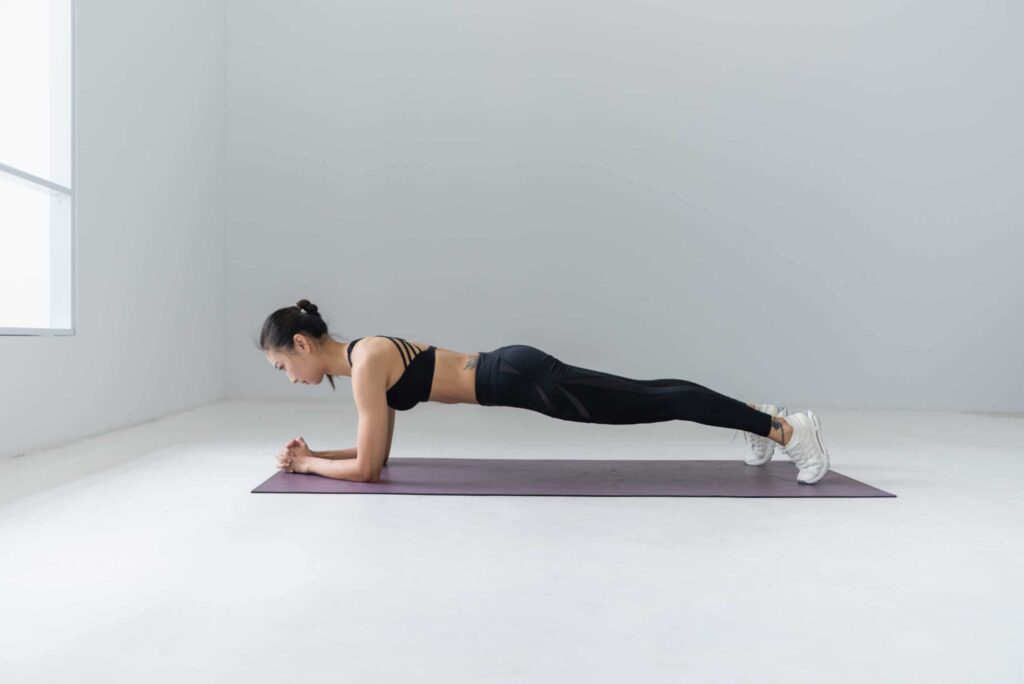
Wake up, slide on your fuzzy slippers, stroll sleepily to the bathroom to wash your face, open your closet door to select an outfit, put on the same ring you always wear, descend the stairs as your cats run by excited for breakfast, feed them, then feed yourself, sip coffee, pack your
lunch, and run out the door to start your day. Complete and repeat.
A routine sounds boring. Routine paints the picture of a mundane lifestyle with little room for inhibition and lightheartedness.
If this is your preconceived notion of routines, I’m here to offer an alternate perspective. Keep reading if you are in the business of implementing structure, increasing contentment, and cultivating soundness of mind.

3 Benefits of Routines
Why even bother establishing and tending to one or many routines? Isn’t it just additional work?
1. Routine provides structure.
Raise your hand if you’ve ever felt frazzled and like your day has slipped by right before eyes. Like hours have passed and you don’t have anything to show for it?
A routine, or set of routines, can help you to be more productive, stay organized, and remain on task.
Using a morning routine, followed by a work routine, then an after-work routine, and a night routine in tandem will leave you feeling more productive because you have made time for things that need to be accomplished via structure and simplified your daily tasks into a habitual regimen.
Here’s a straightforward example:
If you are consistently late to work because you are turning around to grab that elusive folder you need, a routine could help you streamline your morning process and get you out the door on time. This morning routine can build structure by breaking your morning up into individual tasks you complete in succession.
The structure that accompanies routine can be comforting and satisfying because it grants us the ability to identify the fruits of our labor. In other words, if our work routine includes composing a list of tasks to complete, making a cup of tea, checking emails, pushing through a to-do list, and then tying up loose ends, our day has a sense of predictability as well as productivity.
We can never anticipate the unexpected, but the increased predictability that structure and routine give us can set our mind on a clear path that is focused on fruitfulness.
2. Routines help you work toward what you value so you can feel content.
Committing to a routine can assist us in accomplishing tasks or results that we value. Think about how we will feel as we begin to move closer to that which is significant and meaningful to us. Dare I suggest that we would feel a sense of contentment?
When you engage in a routine that helps you work toward the person you want to be, you’re helping yourself visualize the best version of yourself. You’re actively embodying who you want to be.
Let’s talk in terms of an exercise routine. Some may say, “Yeah right, who has time for a workout routine?”
If that’s you, just think in terms of a different type of routine like a cleaning or relaxation routine. Creating and establishing a routine is the easy part. Committing to a routine is the hard part.
We will find motivation to commit to an exercise routine if we value the result- a body that is healthy and happy. Contentment follows when the result is manifested in real life. In our example, contentment comes when we see a positive difference in our bodies, whether it’s increased muscle or decreased body fat.
| Related Reading: How to Eat Healthy Without Going on a Diet: The Ultimate Guide

My workout routine includes coming home from work, immediately trading stiff office clothes for spandex and sneaks, filling up a water bottle, tuning into a fitness video channel, turning on some dance pop, and working out right in the living room.
Workout routines not only afford physical benefits but also psychological benefits thanks to the release of endorphins.
3. Routines have positive effects on your mental health
Routines offer a sense of sanity by housing actions within and systemizing them.
Let’s talk about self-care routines. (Personal plug: If you don’t have a self-care routine, consider developing one- when you finish reading this, of course.)
There is value in having a systemized routine because it implies that the routine is something we do consistently and contains important actions that have meaning. Any type of routine is positive in terms of mental health, but a self-care routine works double duty to boost your mental health to new heights by sectioning off time for you to take care of your body and mind.
A self-care routine is a set of actions that allows your mental state and physical body to be revitalized and refreshed. Some options to include in a self-care routine are journaling, muscle relaxation, meditation, deep breathing, clean eating, taking a bath, taking a walk, exercising,
pampering yourself with a face mask and sugar scrub, stretching, doing something creative, or taking a nap.
Pick a few things that make you feel rejuvenated and develop a process that works for you. Schedule a self-care routine at regular intervals, such as indulging in a self-care routine every Monday and Thursday.
| Related Reading: How to Change Your Life Completely
Working Flexibility into your Routines
You see now that routines have tremendous merit, but as with most things in life, moderation is always important. Routines can also potentially stir up inflexibility if we cling to them with white knuckles.
If you allow your routines to commandeer your life, you may become overly rigid. It’s important to note that the routines you develop and engage in CAN and should be flexible.
If you don’t recognize this darker side of routines, you may feel stressed if the circumstances of life inhibit your ability to carry out your daily routines. If this happens, remember routines are there to assist us and make our lives more efficient and constructive so we have time for rest.
The world won’t come crashing to a halt if your plans get derailed a bit. Take a deep breath and realize that life does not progress in a straight line so bumps are okay. There will be hiccups along the way.
Routines exist for our benefit, not as a source of overwhelm. If you find yourself overwhelmed by your routines, it’s time to reevaluate and adjust until they give you more comfort than discomfort.

Creating a Routine through Small Steps
First, picture what efficiency looks like for you to figure out what you want your routine to look like. You may choose to write down a three-step routine on a sticky note.
Next, choose the first task in your ideal routine and intentionally engage in that task every day. Set a reminder on your phone or fancy Apple watch so you remember to do this first task every day. This will establish a small habit.
Once you have the first task down pat and don’t have to think much about remembering to complete it, you can build on your small habit by adding the next task to your existing habit, and so on. Chunking a goal (breaking it into small bits that are super easy to complete) allows you to feel accomplished every step of the way.
Let’s look at this in the real world. If you don’t have a nighttime routine, slowly build one by working on one task at a time.
For example, begin by flossing each night. Do this for at least a week, ideally even longer. Then add in the next task: writing an entry in your journal after you floss. Floss and create a journal entry for another week (or longer). Lastly, add your last task: moisturizing.
Do all three tasks intentionally each night until you implement the tasks without even thinking about it. The goal is for the completion of the tasks to become subconscious. Time and consistency are the two ingredients that will make your routine stick.
Wrapping up with Intentionality
It’s important to note that you should only add things that you truly value into a routine. You will be more likely to establish the habit and be intentional if you see the importance and benefit of the tasks in your routines.
This means- don’t try to replicate your favorite influencer’s morning routine step by step. In the nicest way- mind your own business and don’t get wrapped up in what others are doing. Establish a routine that’s meaningful for YOU.
Go into this process of creating a routine knowing that intentionality is king here. Intention is required as we create and develop routines. If we lack intention, we can focus our efforts in a slightly different area until we feel the burning desire to engage in and commit to a routine. If you reckon that your life could use some added structure, increased levels of contentment, or soundness of mind, I encourage you to jot down some possible routines that could streamline and systemize your day-to-day life.
Share this post with someone who could use this information and spread the wealth!
And follow me on Pinterest for more encouragement!

So, so true! I do so much better with a routine!
Same here! Solid morning and night routines are where it’s at!
Routines are so needed to help keep our mental health regulated. Thank you for sharing this!
Totally agree that routines do wonders for our mental health! Our brains like consistency.
I like routine, that helps me remember things. And when for some reason I forgot something, there is this internal voice in my head telling me that something is missing.
Yes, for sure! Routines are like a string of habits put together. And habits are automatic, that’s the beauty of routines 🙂
Routines are so essential, I love this!! I tend to have the struggle between being too structured and not being structured enough. I notice I do better when I follow routines, and so do my kids, even though sometimes I feel like I’m being too rigid but when we don’t follow routines, it’s chaos! Thank you for your blog post, this helps give me validation to keep the routines and gives me some areas to work on as well!
I totally hear what you’re saying about feeling too rigid. I feel that way sometimes too. It’s all about creating a routine that allows for a bit of flexibility. 🙂
Love this! I feel like having a steady routine is kind of like having a superpower. When my friends ask me how I get so much done in a day it’s truly because of my routine. My routine helps me to go through the motions even when I don’t feel like being productive.
Agreed! It’s like autopilot in a way, where we can still get things done even when we don’t really want to.
I feel grounded when I keep a daily routine. And when I travel I like to try and keep the same daily routine. Travel can really have a negative impact like disrupting sleep and making us feel anxious. So keeping a routine is really important. Thanks for sharing.
Love your idea to keep as close to your routine as possible when away from home. What a good way to stay consistent 🙂
I am a creature of habit and thrive with structure. Great article! I especially appreciate the section about allowing flexibility as this is something I struggle with at times. Thank you for sharing!
We are alike in this way! I too need to remind myself to be flexible 🙂
I love my routine! It often helps me remember things I would otherwise forget (like taking meds and feeding the pups). And my evening routine helps my brain wind down and relax so I can sleep well.
Yes!! I’m such a fan of a wind down routine at night 🙂
I don’t always follow my morning routine as I should, but when I do I notice that my day goes so much smoother and I feel much more productive. However, I can’t go to sleep without my bedtime routine.
It happens to the best of us! As long as we don’t beat ourselves up for falling off our routines. They’re there to help us, not make us feel guilty 🙂
I love a routine! Helps keep me grounded and also motivated!
Yes! Motivation is such a cool benefit of routines 🙂
Great post. I really thrive with routines. I get sooo frazzled without some sort of routine/ structure!
Same here! They make me feel put together and in control of how my day goes 🙂